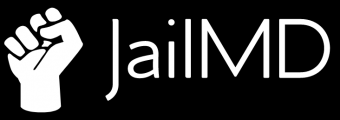Dear Mr. Oldtimer,
There was something about your presence that was regal despite the traditional jail attire and pains of life— I think it was the experience in your stride, your chiseled face, ebony skin, ivory smile, and the little spark that remained in your eyes. By the looks of your chart, much of your 48 years of life was spent in and out of this place and when I asked about it you responded with “yeah… I’m an old timer.” The rest of our conversation was like sitting with an elder who was sharing their story to instill some lessons on me, the listener. So I listened. In the 90s, you lived your normal life until your secret life led to your diagnosis of AIDs. The community you knew, “spread rumors” about your life as a gay man. The diagnosis was a death sentence for you and being shunned by the ones you thought were family led to years of crack and later meth abuse and ultimately living on the streets of Downtown Los Angeles Skid Row. Over the last 30 years, you grew up on these streets, in fact as another elder once described to me, you “had a PhD of the streets”. In the street “encampments” there was a community that you understood, a routine of survival that you had become acclimated to including working as a mechanic, using resources to get health care and substance use treatment. Your situation is what is labeled as “chronic homelessness”, but you knew that and knew about all of the resources that were available to getting you housed because of all of the street outreach teams that have approached you. You chose not to use the help that a number of street teams had offered you and I am certain that you told them exactly what you told me, “When I am ready, I will.” The streets became your community when your friends and family disowned you because of who you loved. The streets accepted you even when you used drugs to help mask your pain as you came to terms with your lifelong diagnosis. You learned to survive independently on the streets, in a way that your livelihood depends on it. Why would you accept the help of others if you only knew how to depend on yourself, and frankly it was all you needed?
So instead of offering help, I wanted yours and asked, “well what should be done for those experiencing homelessness?” You responded with “get the kids and the drugs off the streets.” You went on to describe how the streets had changed over the years and it wasn’t right—there were too many people, more tents, and way too much meth. As someone who left LA for a while and returned, I agreed with what you were saying and have been perplexed by how things got this bad. At some point in my conversation, it became obvious that you had more than knowledge and experience; your wisdom could easily inform many who are trying to solve the “problem” of homelessness. It seems like common sense that people with the power to make a difference would want to hear your voice as they develop and implement new programs to make your life “better”, but it doesn’t always happen that way. Why is that? Is it that you are a black man, a person living with AIDS, a person with justice-involvement, a person experiencing chronic homelessness, or the intersectionality of all of these things that make you a minority of minorities and invisible to the masses? Look I would love for you to be the voice for many, but I didn’t have it in me to ask you. I know that what you have on your plate is more than enough; it is not your responsibility to take on the burden of others. As we wrapped up, I wished you luck knowing you would be alright. You responded with “you know it and I might give those street outreach people a chance.” You know much better than I do, what kind of roof you need over your head.
Honoring your wishes always,
Dr. A

